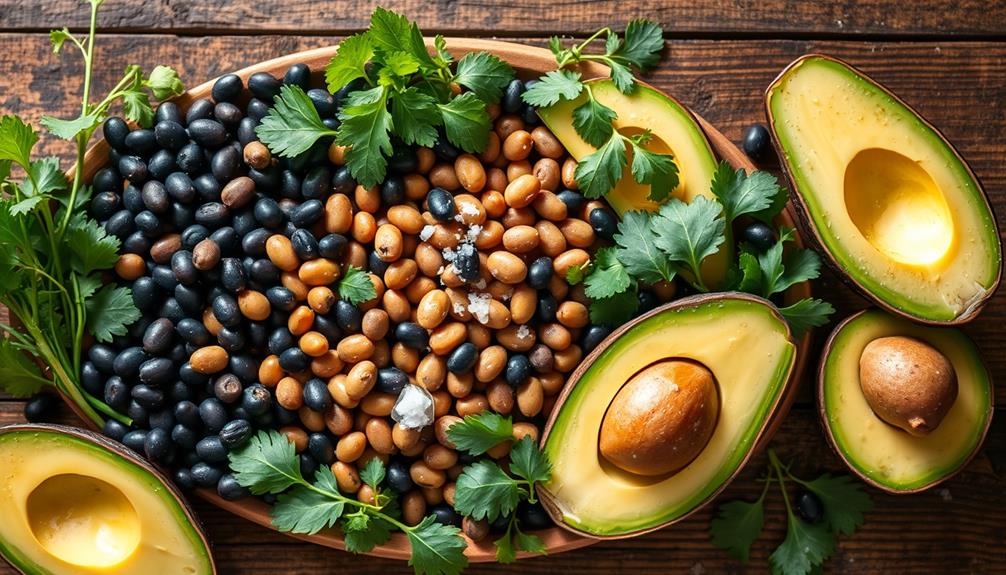When choosing between erythritol and allulose for your keto diet, consider taste, digestion, and how each affects blood sugar. Erythritol offers a sweet, sugar-like flavor with a cooling effect but may cause bloating in some. Allulose tastes nearly identical to sugar and generally causes fewer digestive issues. Both support ketosis and have minimal impact on blood glucose. To discover which suits your preferences and needs best, explore their unique qualities further.
Key Takeaways
- Both erythritol and allulose are low-calorie, keto-friendly sweeteners with minimal impact on blood sugar levels.
- Erythritol offers a sugar-like taste with a cooling sensation, while allulose provides an authentic sugar flavor without aftertaste.
- Erythritol may cause digestive discomfort in large amounts, whereas allulose is generally better tolerated.
- Allulose closely mimics sugar’s flavor profile, making it ideal for baked goods and beverages requiring authentic sweetness.
- Both sweeteners support ketosis and are suitable for low-carb diets, but personal tolerance and flavor preference influence choice.

Erythritol offers a clean, cooling sensation with a sweetness level about 70% that of sugar. Its flavor profile is subtle, with a slight cooling effect that can sometimes be noticeable in baked goods or beverages. Many people find it resembles traditional sugar quite closely, though some describe a slight aftertaste. From a health standpoint, erythritol is generally considered safe and well-tolerated, with minimal calories—almost zero—and a low glycemic index, making it a popular choice for keto enthusiasts. However, consuming large amounts might cause digestive discomfort, such as bloating or gas, because it’s partly fermented by gut bacteria. Additionally, erythritol’s minimal impact on blood glucose makes it especially suitable for managing blood sugar levels.
Allulose, on the other hand, has a flavor profile remarkably close to sugar, with no cooling aftertaste. Its sweetness is nearly identical to sugar, which makes it particularly appealing for those seeking a more authentic sugar-like taste in baked treats or drinks. Nutritionally, allulose is absorbed by the body but not substantially metabolized, resulting in very few calories and a negligible impact on blood sugar levels. This makes it an attractive option for maintaining ketosis. As for health implications, research suggests that allulose may have some benefits, including antioxidant properties and potential blood sugar regulation. It’s generally well-tolerated, though some people might experience mild digestive issues if they consume it in excess.
Frequently Asked Questions
Are Erythritol and Allulose Safe for Long-Term Consumption?
Both erythritol and allulose are generally considered safe for long-term consumption, but you should stay informed about ongoing research. Erythritol has a good safety profile, though some people report digestive issues. Allulose is newer and shows promising safety data. However, you might want to contemplate their environmental impact, as erythritol production can have a higher environmental footprint. Always consult your healthcare provider for personalized advice.
How Do Erythritol and Allulose Affect Blood Sugar Levels?
You might think erythritol and allulose spike your blood sugar, but they don’t have significant blood sugar impact. Erythritol has minimal metabolic effects, as it’s mostly excreted unchanged. Allulose, on the other hand, has a negligible effect on blood glucose and insulin levels. These sweeteners are safe for blood sugar control, making them excellent choices for keto and diabetic diets, without risking blood sugar fluctuations.
Can Erythritol and Allulose Cause Digestive Issues?
Yes, erythritol and allulose can cause digestive issues like bloating and gas in some people. You might experience digestive discomfort if you consume these sweeteners in large amounts, as they are fermented in your gut. To avoid this, start with small servings and see how your body reacts. If you notice bloating or gas, consider reducing your intake or trying other sweeteners better tolerated by your digestion.
Which Sweetener Is More Eco-Friendly to Produce?
You can imagine lush fields of sustainable farming, where erythritol’s production often requires less energy and fewer resources, making it more eco-friendly. Allulose, derived mainly from fruits, involves energy-intensive extraction processes. When considering eco-friendliness, erythritol’s lower demand for production energy and eco-conscious farming practices give it an edge, helping you enjoy sweet treats while reducing your environmental impact.
Are There Any Known Allergies Related to Erythritol or Allulose?
You might wonder if erythritol or allulose cause allergies. Allergy prevalence is low for both, but some people experience immune responses like bloating or stomach discomfort. Erythritol, a sugar alcohol, can sometimes trigger digestive issues, while allulose is generally well-tolerated. If you’re sensitive or have allergies, start with small amounts to observe any reactions. Always consult with your healthcare provider if you’re unsure about trying new sweeteners.
Conclusion
In the battle of erythritol versus allulose, you hold the power to choose your perfect keto-friendly sweetener. Both bring their own magic to your treats, but remember, the right choice can transform your baking into a symphony of flavor that dazzles more brightly than a thousand suns. So, experiment boldly, savor every bite, and let your taste buds lead you to sweet success. Your keto journey just got a whole lot sweeter—and more exciting!









